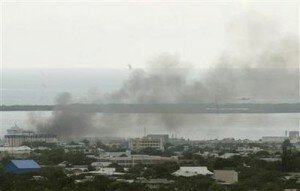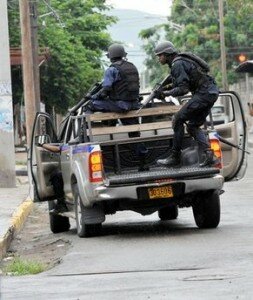Jamaica official: 44 civilians dead in Kingston

Smoke billows over Tivoli Gardens community
KINGSTON, Jamaica – Jamaican security forces claimed a tenuous hold over the slum stronghold of a gang leader sought by the U.S., but only after battles that killed at least 44 civilians, the country’s official ombudsman said Wednesday.
Officers and soldiers were still fighting holdout defenders of Christopher Coke, known as “Dudus,” in pockets of the Tivoli Gardens area. He was still at large after nearly three days of street battles.
Bishop Herro Blair, Jamaica’s most prominent evangelical pastor, told The Associated Press that independent evaluations have put the number of civilian dead at 44 in West Kingston alone. Police have said that at least four soldiers and police officers also have died in fighting in West Kingston and elsewhere around the capital.
Police earlier reported at least 26 civilian deaths and the country’s embattled Prime Minister Bruce Golding promised an independent investigation into all civilian deaths during the operation.
Blair and Jamaica’s public defender were escorted by security forces into Tivoli Gardens, where supporters of Coke began massing last week after Golding dropped his nine-month refusal to extradite him to the U.S.
Coke has ties to Golding’s Labor Party, which gets a large number of votes from the Tivoli Gardens area Golding represents in parliament.
In a Tuesday address to legislators, Golding indicated he was taken aback by the intensity of the assault.
“The government deeply regrets the loss of lives, especially those of members of the security forces and innocent, law-abiding citizens caught in the crossfire. The security forces were directed to take all practical steps to avoid casualties as much as possible,” he said.
Golding vowed that the “most thorough investigations” would examine all deaths caused by security forces, which have a reputation for slipshod investigations and for being too quick on the trigger. He also said security agents would go after “criminal gunmen in whatever community they may be ensconced.”
Government officials told reporters all the dead civilians in West Kingston were men. But people inside the slums told local radio stations there had been indiscriminate shootings during the assault that police and soldiers launched Monday.

Riot police take to streets
The gunmen fighting for Coke say he provides services and protection to the poor West Kingston community — all funded by a criminal empire that seemed untouchable until the U.S. demanded his extradition.
Coke has built a loyal following and turned the neighborhood into his stronghold. U.S. authorities say he has been trafficking cocaine to the streets of New York City since the mid-1990s, allegedly hiring island women to hide the drugs on themselves on flights to the U.S.
Golding had stonewalled the U.S. extradition request for nine months, straining relations. A U.S. State Department report earlier this year questioned the Caribbean island’s reliability as an ally in the war against drugs, and Golding’s stance drew domestic opposition that threatened his political career.
The government imposed a monthlong state of emergency for the tense Kingston area Sunday, after an eruption of violence by gangsters that security forces called unprovoked.
The violence has not touched the tourist meccas along the island’s north shore, more than 100 miles (160 kilometers) from Kingston, or the nearby Montego Bay airport. However, Jamaican officials said they were very concerned about the impact on tourism.
“The entire Caribbean and the world is trying to pull itself out of a recession. This kind of hit, if one can call it that, comes at a very, very bad time,” said Wayne Cummings, president of Jamaica’s Hotel and Tourist Association.
Along the pitted and trash-strewn streets of West Kingston that few tourists ever see, residents say Coke is feared for his strong-arm tactics, but also is known for helping slum dwellers with grocery bills, jobs and school fees.
Coke’s influence extends well beyond the capital. Police say gunmen from gangs that operate under the umbrella of his Shower Posse elsewhere on the island have been flocking to his defense.
U.S. federal prosecutors in New York say drug traffickers in the United States routinely sent Coke gifts, including clothes, accessories and car parts in recognition of his influence over the American cocaine trade.
“Mr. Coke is a strongman whose tentacles spread far and wide,” said the Rev. Renard White, a leader of a Justice Ministry peace initiative that works in Jamaica’s troubled communities.
—————–
Source:-AP
Comments
comments
 Calendar
Calendar





































